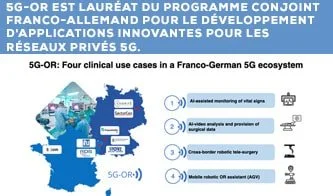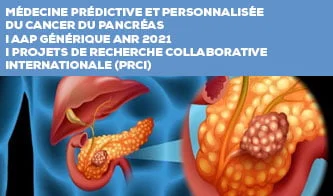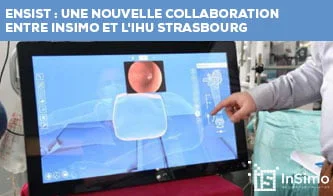
The 5G-OR Program is a winner of the joint Franco-German Program for the development of Innovative Applications for 5G Private Networks
PRESSE RELEASE
Berlin, Mannheim, Rennes, Reutlingen, Strasbourg and Tuttlingen
February 3rd, 2022
5G-OR is one of the 4 winning projects jointly selected by the Federal Ministry of Economics and Climate Action in Germany and the Ministry of Economy, Finance and Relaunch in France for the call “Technical developments and application ecosystems for 5G private networks”. The joint Franco-German 5G-OR project takes up the challenge in the healthcare domain. It will explore the benefits of a 5G-enabled operating room ecosystem – a fundamental hospital component – to support medical and paramedical teams to improve patient outcome. The ambition is to strengthen Europe’s position in the 5G-enabled medical technology arena by establishing an innovation ecosystem for the development of new products and quality services.
Towards the hospital of the FUTURE
Digitisation is now being integrated into the modern hospital infrastructure. In this context, wireless communication technology is emerging as a central element of a hospital’s future environment with the need to achieve rapid and secure data transmission and analysis. The goal of 5G-OR is to create a demonstrator of a Franco-German 5G private network application ecosystem for hospitals with a specific focus on the Operating Room (OR) environment. The OR is a highly suitable environment to demonstrate the value of the intra-hospital 5G private network as it is the most concentrated node of healthcare complexity with data-dense and logistics-heavy requirements. In addition, the OR is the highest risk environment for patient safety and a major cost centre for the hospital.
5G-OR is centred around the development of the next generation of a 5G-enabled OR ecosystem intended to improve patient outcome. The underlying concept is that data-driven and Artificial Intelligence assisted surgery within a digital OR will enable more accurate and precise operations as well as fewer complications. The OR generates massive and disparate data from a multitude of sources. Here, the challenge is to make data usable for example by providing real-time feedback to medical staff. The 5G communication technology holds the capacity to enable efficient exploitation of the data generated in the OR. It is expected that efforts towards standardisation requirements for quality service and industrialisation will take the next-generation OR to a new level of service. 5G-OR will assemble these elements into a workable and reproducible package and subsequently validate its worth and interoperability with cross-border clinical use cases.
Four clinical use cases
The consortium has selected four use cases to be operated in the Franco-German 5G ecosystem to demonstrate the value of 5G private networks in the OR. The first two use cases tackle the decision-making in the OR for better patient safety through real-time analysis of massive data. The teams will use Artificial Intelligence to continuously analyse patient vital signs and surgical video, transmitted by 5G wireless medical devices for the detection of early warning signs of potential complications. Another use case pertains to remote-enabled robotic telesurgery powered by real-time data with the goal to perform remote cross-border robotic telesurgery using a 5G network connection. The fourth use case targets the optimisation of the complex logistics of the OR environment. The consortium will evaluate the benefits of 5G-enabled logistics support in the OR by autonomous mobile robotic assistant providing devices, materials, and instruments required for surgery.
A unique multidisciplinary consortium
The 5G-OR consortium is well balanced between R&D, Healthcare, and business. It is leveraging strong cooperation between complementary French and German partners, who have a common vision of the digital OR for better patient care. This includes hospitals and R&D centres : Institute Fraunhofer IPA in Mannheim, Institute of Image-Guided Surgery in Strasbourg, Institute of Research and Technology b<>com in Rennes, Charité University Hospital in Berlin, Reutlingen University, together with an innovative large company and SMEs : Karl Storz in Tuttlingen, SectorCon in Berlin and RDS in Strasbourg. Partners in 5G-OR are leaders in all aspects needed for the success of the project and have already made significant contributions to solving critical elements of this global vision.
Project profile
5G-OR – Establishing the next generation of a 5G-enabled operating room ecosystem to improve patient outcome, Project Link
Duration: Three years from January 1, 2022
Budget and Funding volume: Total Budget: 5,9 M€; Total Funding: TBD;
Project partners
| GERMANY | FRANCE |
|
b<>com Institute of Research and Technology RDS (Rhythm Diagnostic Systems)
|
Contacts project coordinators
| GERMANY | FRANCE |
| Fraunhofer IPA | IHU Strasbourg |
| M. Johannes Horsch Tel. +49 621 17207146johannes.horsch@ipa.fraunhofer.de |
M. Jean-Luc Dimarcq Tel. +33 3 90 41 36 00jean-luc.dimarcq@localhost |
CONTACTS PRESSE
| GERMANY | FRANCE |
|
joerg-dieter.walz@ipa.fraunhofer.de
|
Download the complete press release in French, February 3, 2022







Recent Comments